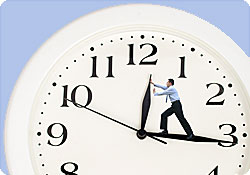We have all heard the questions asked, and regularly asked them ourselves. So in a time when we have had a flurry of new appointments in the last 12 months or so, who are our new judges, and how are they enjoying their career changes? Sir Harry Gibbs chambers asked two of our most recent appointees how they were finding their new careers.
Justice Duncan McMeekin was appointed to the Supreme Court on 15 October 2007. His Honour enjoyed three months in Brisbane before taking up what he expects to be a long term spot as the new central judge in Rockhampton.
Did his Honour think that his appointment was going to provide him relief from the state of being constantly overworked, and when did he realise there was to be no such respite?
“It is a different world for a judge; that is true. The pressures are different, although perhaps not less. My experience of course is not the same as everyone else’s. I am on my own in the country. I control my own lists. In Brisbane one is much more likely to be allocated something than having to do everything that comes along. And the work is always present.”
Judge David Andrews was appointed to the District Court on 28 March 2008. Despite hailing from a family of distinguished judicial officers, Judge Andrews says he was singularly unprepared for what a wonderful role he was stepping into.
“It is fantastic,” he said, “I love it. The hours are still long for a new judge, but it is different. I no longer wake up in the middle of the night wondering if I have done enough research, or missed an important case. And being in the District Court is great because I get to travel to parts of Queensland that I have never been to before.”
Justice McMeekin has had a small number of counsel call on him in the last nine months, but his Honour wonders whether the increasing role of the litigant in person has affected counsel’s ability to follow this tradition, or whether the large number of judges makes it too burdensome for counsel. Anecdotally his Honour wonders whether many of the younger counsel even know that such a tradition exists.
 Criminal matters are occupying more of their Honours’ time across the board. Justice McMeekin notices this particularly in Rockhampton, although there is a more even balance of civil and crime in Mackay.
Criminal matters are occupying more of their Honours’ time across the board. Justice McMeekin notices this particularly in Rockhampton, although there is a more even balance of civil and crime in Mackay.
Judge Andrews has found sitting in crime to be a wonderful change.
“Change is something I didn’t ever really see at the bar, and now I realise how much I like it. Naturally I do have to work even harder in areas which were not my principal areas of practice at the bar, but I find the novelty to be exhilarating.”
Asked about how it felt to be now part of the public service structure1 rather than in private practice, Justice McMeekin laughed and gave some examples.
“It can be frustrating to be constantly having to account for pens and post it notes. Tea and coffee of course does not come with the job, at least not up here.”
His Honour’s position is not unique. No Supreme Court judges have tea or coffee provided. Strangely, in the Court of Appeal, the government will pay for the Appeal Court judges’ tea and coffee on sitting days, but they have to provide their own on non-sitting days.
Judge Andrews, by contrast, is yet to find the public service regime intruding into his day to day business. Perhaps his associate buys his coffee.
Refreshingly, Justice McMeekin was not unduly critical of counsel who gave hopelessly inadequate time estimates for chamber applications. His Honour suggested however a number of tips to improve reliability of estimates. He suggests one should ask the Judge whether he or she has had time to read the material; if they have not, allow a sensible reading time. An outline of course is essential. Work out how long you think you will be, and then ask the opposing counsel how long they will be; often it may be much longer than you had supposed. Add in something for the time the judge may take with questions and comments. Prepare carefully.
 Judge Andrews had a bullet proof method for dealing with inadequate time estimates; he makes the parties stay until they finish! Recently his Honour had a matter before him in which the estimate was 2 hours, but 5 hours later he could sense counsel’s frustration that the matter had not concluded. He devilishly enjoyed making counsel finish the application properly in the hope that it would encourage them to be more careful in their approach to estimates next time.
Judge Andrews had a bullet proof method for dealing with inadequate time estimates; he makes the parties stay until they finish! Recently his Honour had a matter before him in which the estimate was 2 hours, but 5 hours later he could sense counsel’s frustration that the matter had not concluded. He devilishly enjoyed making counsel finish the application properly in the hope that it would encourage them to be more careful in their approach to estimates next time.
Judge Andrews also suggests that counsel should remember that for many judges it will have been a long time since the more pedestrian matters have come across their desks for a chamber application.
“I recently heard an application for substituted service in which counsel who appeared before me effectively read his material and handed up a draft order. There was no guidance on the principles for what was, I accept, a straightforward matter. But I had not done such an application for many, many years, and so I had to do all the work myself.”
Despite some gentle criticism, their Honours believed they were generally well assisted by experienced counsel. Both their Honours were glowing in their praise of the criminal bar as both of assistance to the court and the providers of exemplary representation to their clients.
His Honour Judge Max Morley is once reported to have said that a barrister should always wear a coat and tie at home on the weekend, just in case a tradesman calls. Assuming that to be correct, what then should a Supreme or District Court judge wear at home?
“Well, I live at the beach,” Justice McMeekin replied “So my garb is somewhat different. You might find me in my wig, but definitely not the rest!”
Judge Andrews, always known as an elegant dresser while at the bar, no doubt has never had to worry about being underdressed for any visitors!
Rebecca Treston
Footnotes
- The writer realizes of course that the judges are not public servants, although it may feel that way to them at times.




 Criminal matters are occupying more of their Honours’ time across the board. Justice McMeekin notices this particularly in Rockhampton, although there is a more even balance of civil and crime in Mackay.
Criminal matters are occupying more of their Honours’ time across the board. Justice McMeekin notices this particularly in Rockhampton, although there is a more even balance of civil and crime in Mackay. Judge Andrews had a bullet proof method for dealing with inadequate time estimates; he makes the parties stay until they finish! Recently his Honour had a matter before him in which the estimate was 2 hours, but 5 hours later he could sense counsel’s frustration that the matter had not concluded. He devilishly enjoyed making counsel finish the application properly in the hope that it would encourage them to be more careful in their approach to estimates next time.
Judge Andrews had a bullet proof method for dealing with inadequate time estimates; he makes the parties stay until they finish! Recently his Honour had a matter before him in which the estimate was 2 hours, but 5 hours later he could sense counsel’s frustration that the matter had not concluded. He devilishly enjoyed making counsel finish the application properly in the hope that it would encourage them to be more careful in their approach to estimates next time.